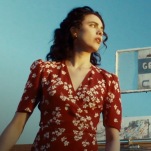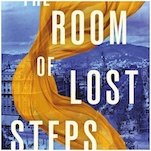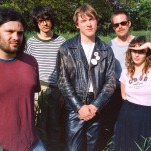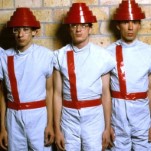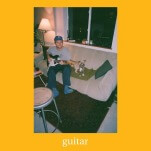Jenny Lewis: Still Searching
“You have to do your homework,” says Jenny Lewis, early one sunny California morning not too long ago. “That moment of inspiration is always welcome, but you have to work on it. You can’t just get stoned, write a riff and expect that to be the full song.” She’s talking about the long and arduous creative process that produced “Late Bloomer,” the centerpiece of her third solo album, The Voyager. “You have to get stoned, write a riff and then work on it later.”
Lewis worked on “Late Bloomer” for several years, carefully teasing out the story of a “furious and restless” young woman who gets lost in Europe, meets a headstrong woman named Nancy and searches for a songwriting hero. The kernel of the coming-of-age tune was based on Lewis’ own experiences: “When I was a teenager, I went to Europe on a backpacking trip by myself, and I met a woman who was following Sebadoh. It was the early 1990s, and that was my introduction to indie rock.”
But Lewis struggled to develop the story into something both personal and fictional: an essentially true story of lost innocence and new horizons. “I knew what I wanted to say, but I didn’t know how to say it,” she says. “I didn’t know how to wrap the story up.” It was Beck who finally persuaded her to finish it up. Or, more correctly, made her do her homework. While she was recording tracks at his studio in Malibu, Lewis played him a snippet of what was then called “Searching for LB.” “I didn’t have a last verse, so Beck instructed me to go into one of the guest bedrooms and not come out until I had finished it.” In the final verse, Lewis’ narrator and Nancy finally find Lou Barlow (the LB of the original title) in Paris, yet sexual jealousy severs their friendship. It’s one of the bravest verses Lewis has written, wrapping up with this bluntly devastating admission: “I promised I’d write her, but I never did.”
The lyrics were there, but “LB” was far from complete. Because Lewis has conceived it as a sequel of sorts of “Rabbit Fur Coat,” the title track from her 2006 solo debut, the song was a dirge: slow, deliberate, dark, rueful and emotionally bleak. It played, in other words, like a true story. Which it wasn’t. Not exactly. “I took the song to Ryan Adams at Pax Am [Adams’ Hollywood studio], and he was immediately frustrated by it. It agitated him. He didn’t know what to do with it because he thought it was so confessional. It’s not confessional, Ryan!” Adams sent her upstairs to work on it with Benmont Tench, the keyboard player for Tom Petty & the Heartbreakers. “Benmont fucking Tench! That made me so nervous. But he looked at me and said, ‘I know exactly what to do wit it.’”
The result is a folk-rock road tune, a breezy story-song in the Gram Parsons mode, with punctuations of Byrdians guitar, a high-flying bridge, some of the finest vocals Lewis has ever put down on tape, and a pervasive, yet gentle melancholy. Few of the events actually happened, but it has the mood of truth. It’s about youthful apprenticeship—creative, cultural, sexual—so it’s apt that it took a small army of collaborators, elders and advisers to shape the song. “It’s funny how a song can start in your mind, and then when it goes through all the filters, it ends up in a totally different spot. Without Beck, that song wouldn’t have been finished. Without Ryan and Benmont, that song would be the slowest song on the album.”
And without Lou Barlow, the song wouldn’t even be. “I sent the song to him and told him the story behind it,” Lewis says. “I was totally surprised that he actually came into the studio, because it was a bit stalker-y on my part. It was the most meta thing I’ve ever done.”
![]()
It’s been 16 years since Jennifer Diane Lewis, a former child actor turned songwriter, co-founded the L.A. indie-pop act Rilo Kiley, and it’s been seven years since that band’s last album, 2007’s Under the Blacklight. Although nothing specific has been announced, that group appears to be either defunct or on indefinite hiatus, with each of its members moving on to other projects. Since then, Lewis has released a handful of solo albums exploring different facets of West Coast pop. Rabbit Fur Coat, on which she shared billing with the Watson Twins, was a country-rock opus, its sound defined by steely Bakersfield guitars, dusty Laurel Canyon harmonies and the kind of wry L.A. songwriting most often associated with Randy Newman and Jackson Browne.
Her follow-up, Acid Tongue, was wilder and woolier, never quite as accessible but also much more adventurous in its subject matter and song structures. It felt like a transitional album, simultaneously open-minded and overthought, and perhaps suffered from Lewis’ hectic schedule: it was, after Coat and Blacklight, her third album in three years. Perhaps stung by Tongue’s sour reviews, she would record one more album, I’m Having Fun Now, with Johnathan Rice, then lay low for a couple of years.
“I knew when we made the Jenny & Johnny record that the next thing I had to do was make a solo record,” Lewis explains. She has been working on some of the songs from The Voyager since 2009, recording rough demos at home via Garage Band. Sometimes she knew exactly what she wanted: “I produced [opening track] ‘Head Underwater’ with Johnathan, and it turned out exactly how I imagined it.” Other tracks, like “Late Bloomer” took much longer to tease out; in fact, several tracks transformed dramatically once she was in the studio with Beck and Ryan Adams.
Each offered a very different approach to refining and recording her songs. Beck worked closely with Lewis to develop her demos into fleshed-out songs. His touch is most obvious on the first single, “Just One of the Guys,” with its loping, slightly narcotized beat and chorus of “ba-ba-ba”s. Adams was a very different, almost antagonistic presence in the studio. “Ryan didn’t want to hear demos,” Lewis recalls. “He didn’t want to know about any of the songs before we recorded them. He didn’t want context.”
-

-

-

-

-

-

-

-

-

-

-

-

-

-

-

-

-

-

-

-

-

-

-

-

-

-

-

-

-

-

-

-

-

-

-

-

-

-

-

-


